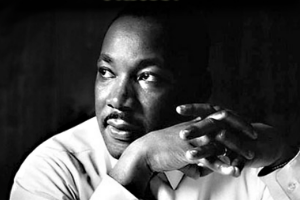
By Sister Tarpley, NDG Religion Editor
January 15, 1929, is the day that Martin Luther King came into this world, and on the third Monday of January, our nation will celebrate the life of Dr. Martin Luther King, Jr., a Nobel Peace Prize winner in 1968 at age 35, for his contributions to our nation and to the world.
Dr. King (January 15, 1929–April 4, 1968) was born Michael Luther King, Jr., but later he had his name changed to Martin. His grandfather began the family’s long tenure as pastors of the Ebenezer Baptist Church in Atlanta honoring and praising God, he served from 1914 to 1931.
Dr. King’s father served from then until his death; and from 1960 until his death Dr. Martin Luther King, Jr. acted as co-pastor.
Dr. King attended segregated public schools in Georgia, graduating from high school at the age of 15; he received his B. A. degree in 1948 from Morehouse College, a distinguished Negro institution of Atlanta from which both his father and grandfather had graduated.
After three years of theological study at Crozer Theological Seminary in Pennsylvania where he was elected president of a predominantly white senior class, he was awarded the B.D. in 1951. Dr. King received his doctorate degree in 1955.
In Boston, he met and married Coretta Scott, a young woman of uncommon intellectual and artistic attainments. Two sons and two daughters were born into the family.
In 1954, Reverend Martin Luther King, Jr. became pastor of the Dexter Avenue Baptist Church in Montgomery, Alabama and he was a member of the executive committee of the National Association for the Advancement of Colored People, the leading organization of its kind in the nation. In December 1955 he accepted the leadership of the first great Black nonviolent demonstration of contemporary times in the United States; the bus boycott lasted 382 days.
On December 21, 1956, after the Supreme Court of the United States had declared unconstitutional the laws requiring segregation on buses, Blacks and Whites rode the buses as equals. In 1957 he was elected president of the Southern Christian Leadership Conference (SCLC), an organization formed to provide new leadership for the now burgeoning civil rights movement. The ideals for this organization he took from Christianity; its operational techniques from Gandhi.
In the eleven-year period between 1957 and 1968, Dr. King traveled over six million miles and spoke over twenty-five hundred times, appearing wherever there was an injustice, protest, and action; and meanwhile, he wrote five books as well as numerous articles.
In these years, he led a massive protest in Birmingham, Alabama, that caught the attention of the entire world, providing what he called a coalition of conscience.
Dr. King planned voter registration drives in Alabama and he directed the peaceful march on Washington, D.C., of 250,000 people to whom he delivered his address, “l Have a Dream”, he conferred with President John F. Kennedy and campaigned for President Lyndon B. Johnson.
He was awarded five honorary degrees; was named Man of the Year by Time magazine in 1963, and became not only the symbolic leader of American Blacks but also a world figure. At the age of thirty-five, Dr. Martin Luther King, Jr., was the youngest man to have received the Nobel Peace Prize. When notified of his selection, he announced that he would turn over the prize money of $54,123 to the furtherance of the civil rights movement.
Christian Wisdom and Quotes by Dr. King
“It is impossible for a person not to be puffed up by his good works unless he has first been deflated and destroyed by suffering and evil to the point that he knows that he is worthless and that his works are not his but God’s.”
“Injustice anywhere is a threat to justice everywhere.” ― Martin Luther King Jr.





Wondering why the author chose to refer to Morehouse as a ‘Negro institution’ instead of an Historically Black College (HBCU)…?
It’s an outdated term.
That is a fair question. However, please note Sister Tarpley grew up in an era when this was likely a common term.
As an editor, I did not consider, how some react to the term as it is one I heard from my parents who would be peers of Sister Tarpley. Of course it remains a part of UNCF’s name as well.
Thanks for reaching out!